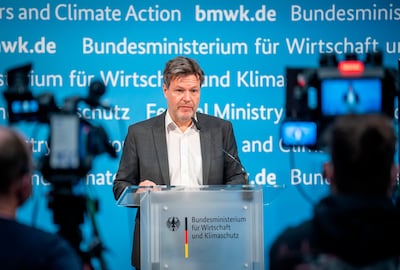German officials will not recommend keeping nuclear power plants on the grid beyond their long-awaited December switch-off date despite the energy crisis exacerbated by Russia’s invasion of Ukraine.
Officials concluded in a politically sensitive study that keeping the last three reactors online would lead to technical and legal problems that would not be worth tackling for what they described as a small amount of extra power next winter.
The findings, accepted by Economy Minister Robert Habeck, dash the hopes of some politicians that extending the life of Germany’s nuclear plants could fill the gap left by unpredictable and politically toxic Russian gas imports.
Mr Habeck, from the avowedly anti-nuclear Green party, used the alleged shelling of Ukrainian nuclear plants by Russian forces to underline the safety risks that have long dominated the debate on such power in Germany.
“When for the first time on the European continent, nuclear power plants are being shot at by tanks … only the highest level of security is a good level of security,” Mr Habeck said.
Under legislation passed after the 2011 Fukushima disaster in Japan, Germany’s last three plants, Emsland, Neckarwestheim and Isar 2, will lose their licence to operate at the end of 2022.
Although long prepared for, the task of filling that gap has been widened by Germany’s climate-related quest to phase out coal power by 2030 and its newfound desire to cut off Russian gas imports.
Unlike the UK and US, Germany has not announced an embargo on Russian energy but the risk that Moscow will turn off the tap has hung over Europe’s response to the crisis in Ukraine.

While there is no indication of Germany rethinking its wider stance on nuclear power, some politicians have called for fission to be given a short reprieve as a transition fuel while longer-term alternatives are found.
That was the view taken by leaders of the European Union when they moved last month to designate atomic energy as sustainable, in a victory for pro-nuclear countries such as France.
But any extension of nuclear operations in Germany would require a political consensus and could fall foul of legally mandated risk assessments, said the five-page joint report by the economy and environment ministries.
Citing legal difficulties, safety issues, personnel and technical problems and the overall balance of risk, it argued against an extension of the last three plants and rejected the idea that the three others closed in 2021 could be revived.
Although an 80-day extension to March 2023 would be possible, it would require them to produce less power this summer to save up fuel stocks, officials said, meaning there would be no net gain of power.
Those fuel stocks are expected to be used up by the end of the year, while technicians are expecting to leave their posts – meaning dozens of roles might need filling when few people have been trained in the field in recent years.

The paper also raised safety concerns because the condemned plants have not had a full inspection since 2009, after a 10-yearly evaluation – due in 2019 – was waived due to their impending closure.
Consequently, the safety certificate of each plant would be 13 years old by 2023 and hurrying through a new one would require politicians to “break with the current German safety philosophy”, ministers were told.
Any extension would come with the cost of dealing with radioactive waste and operators have indicated the government would need to step in and cover the unexpected costs, the paper said.
Even if these problems were overcome, it said, the three reactors would account for only about 5 per cent of Germany’s electricity production and not provide insurance against a withdrawal of Russian gas.
“Weighing up the risks and benefits, a life extension of the three remaining nuclear power plants in light of the current gas crisis is not to be recommended,” the paper concluded.
Officials have said the winter of 2022/23 is the moment when current gas stocks will run low. The ministries said coal reserves could be called upon to fill that gap if necessary.
To fill the longer-term void, Germany plans to build two terminals to import liquefied natural gas from countries other than Russia, a method which requires special infrastructure but allows fuel to be shipped from overseas.
Ministers have targets of putting solar panels on every suitable new roof, as well as covering 2 per cent of Germany’s territory with wind turbines.


